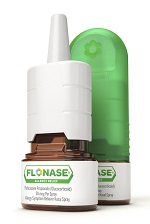 Spring is arriving, bringing with it pollen, allergy suffering, and litigation. With a $35 billion allergy market at stake, Johnson & Johnson ($JNJ) and GlaxoSmithKline ($GSK) are duking it out over whose products do the best job of treating sniffling, sneezing and stuffy noses.
Spring is arriving, bringing with it pollen, allergy suffering, and litigation. With a $35 billion allergy market at stake, Johnson & Johnson ($JNJ) and GlaxoSmithKline ($GSK) are duking it out over whose products do the best job of treating sniffling, sneezing and stuffy noses.
J&J, whose McNeil Consumer Health sells Benadryl and Zyrtec, has sued GSK over advertising claims the British drugmaker made for its Flonase, Reuters reports. GSK last July got FDA approval for over-the-counter sales of the nasal spray and is aggressively marketing this allergy season. But according to J&J, GSK is trying to steal market share with claims that are unsupported by science, even though its ads do not even specifically name a J&J product.
The GSK TV spot instead says Flonase outperforms the "No. 1 allergy pill," and controls 6 allergy symptoms while the leading pill controls one, according to the lawsuit. The suit is seeking an injunction to stop the advertising, saying that McNeil's sales could take a hit just as "the prime allergy sales season" is quickly approaching. A GSK spokesperson said the company was reviewing the lawsuit.
Forbes, citing data from BCC Research, says that 40 million Americans suffer from allergies and that the market for diagnosing and treating them is expected to be $35 billion this year and swell to $47 billion in 2020.
With that kind of money at stake in just one category, it is no wonder that a number of pharma players have been focusing more on consumer health brands. This is a particularly sensitive time for both J&J and GSK. McNeil in the last couple of years has been able to get retailers fully stocked with its top consumer brands after quality problems at its key OTC plant forced it several years ago to recall and destroy tens of millions of units. It reported sales of OTC products of $1.3 billion in the U.S. last year. GSK, meanwhile, has made consumer health one of its key growth segments and has created a joint venture with Novartis to handle this area of business for the two of them.
These kinds of spats are not uncommon. In fact, in January, the National Advertising Division of the Council of Better Business Bureaus said that Novartis ($NVS) should stop making claims its Theraflu Multi-Symptom Severe Cold "starts to get to work in your body in 5 minutes." The recommendation came after competitor Pfizer ($PFE) complained that the product's active ingredients--acetaminophen, dextromethorphan and phenylephrine--are standard in OTC severe cold remedies and don't provide relief especially quickly in Theraflu.
- here's the Reuters story
- get more from Fortune